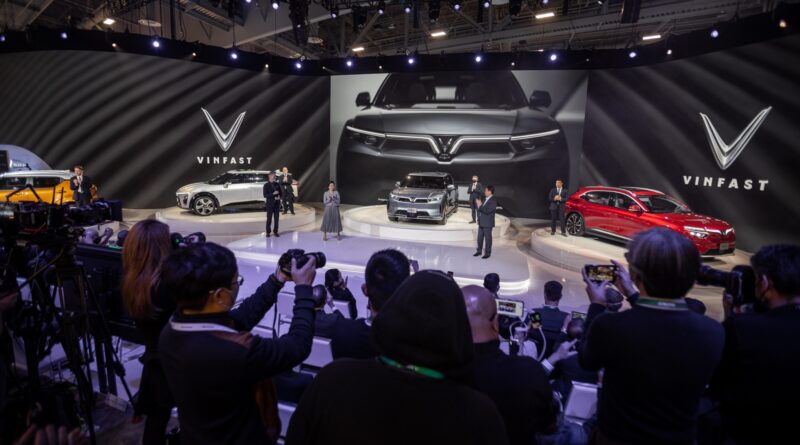Vietnam’s Vingroup strikes tech deals to take EV business global
Top Vietnamese conglomerate Vingroup and its automotive subsidiary VinFast have positioned themselves to become a global player in electric vehicles through a series of deals with tech companies.
VinFast launched its EV manufacturing business in December last year and has yet to sell an electric vehicle outside of Vietnam, but the company’s bold sales goal reflects Vingroup’s confidence.
“We’ll sell 1 million EVs globally in five to six years,” said Le Thi Thu Thuy, VinFast’s global CEO.
VinFast will soon break ground on an auto plant in the US state of North Carolina, investing USD 2 billion in the factory’s first phase, due to open in July 2024. When the American plant was announced, the company said it would exit gasoline-powered vehicles this year.
The Vietnamese automaker is betting everything on electrics. Its domestic assembly plant in the northern city of Haiphong, which makes both gasoline-powered autos and EVs on the same line, is steadily producing a higher ratio of EVs.
ProLogium Technology, a Taiwanese developer of solid-state batteries, is one of the companies supporting VinFast’s gamble. The automaker said on July 6 that it will invest tens of millions of dollars into ProLogium, which will supply batteries to VinFast starting in 2024.
Solid-state batteries are expected to double an EV’s driving range compared with lithium-ion counterparts while reducing recharging time by 66%. But developing the technology for the mass production of solid-state batteries represents a significant hurdle, and VinFast is considering creating a joint venture manufacturing company in Vietnam with ProLogium.
Vingroup intends to open its own EV battery plant in the central province of Ha Tinh as soon as this year. The group has also partnered with China’s Gotion High-Tech on research into lithium iron phosphate batteries, which do not use expensive cobalt. The two sides plan to open a separate plant in Ha Tinh in 2024.
Elsewhere, Vingroup signed a deal with Intel to develop a range of electronic equipment.
“You can see how serious Vingroup is,” said an executive at a major Japanese trading company familiar with the conglomerate’s track record.
Vingroup began mainly as a real estate concern before declaring in 2017 that it would enter the automobile field. The company started making and selling vehicles just two years later.
Vingroup profited from developing property in choice urban locations, then poured those earnings into its fledgling automotive business. A boost from Vietnam’s ruling Communist Party appears to have made this unique business model workable.
Pham Nhat Vuong, Vingroup’s founder and chairman as well as Vietnam’s first billionaire, said he wants to improve the quality of life for Vietnamese. Vingroup’s corporate values include “patriotism” and “ethnic pride.”
“I could see that Vietnamese were not well respected around the world,” Vuong told domestic media earlier this year, describing how Vietnamese living abroad would hide their ethnicity. “I want to do my best to change that.”
Vingroup and the Communist Party share the goal of cultivating the country’s best-known private-sector enterprise. The group did not waste time exiting its television, smartphone, and retail businesses to protect the loss-making automotive segment.
These developments have left Vingroup’s revenue largely flat since 2018. The manufacturing segment, dominated by VinFast, suffered a roughly VND 23 trillion (USD 1 billion) pretax loss last year, which dragged the group’s net profit into the red.
Vingroup’s EV sales have not risen as the company anticipated. The group only sold about 2,100 units during the first half of this year.
Even though Vingroup is said to be close to the Communist Party, “it’s a private company in terms of capital,” said Masayuki Imai, an analyst at Aizawa Securities. “The biggest challenge is raising funds needed for the copious forward spending required by the EV business.”
VinFast is expected to postpone its US listing until 2023 or later. Initial public offerings have slumped due to rising US interest rates, while an American listing will face stringent disclosure requirements. Though North Carolina granted USD 1.2 billion in incentives for the plant, building a sales network will require more money.
This article first appeared on Nikkei Asia. It has been republished here as part of 36Kr’s ongoing partnership with Nikkei.

